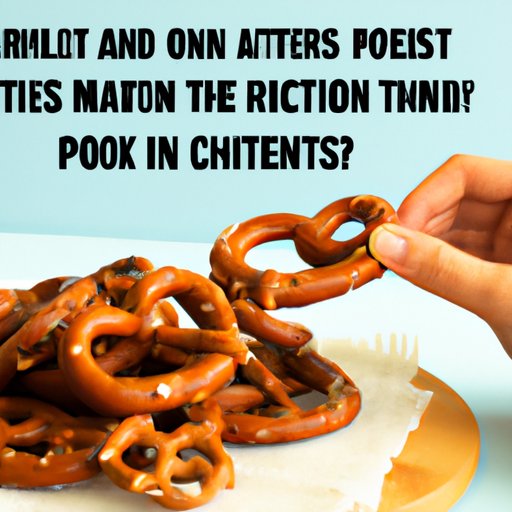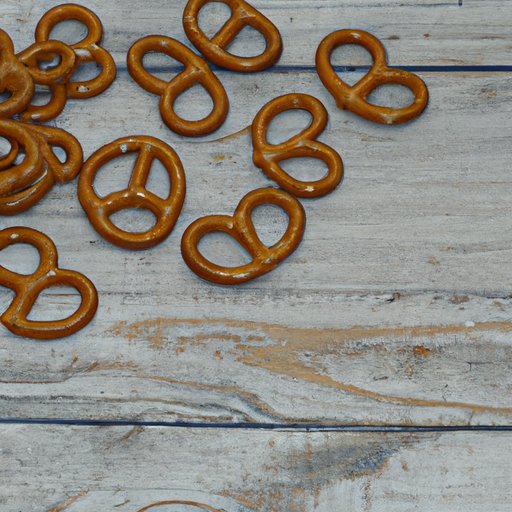Introduction
Pretzels are a popular snack food that is enjoyed all over the world. They are made from flour, water, salt, and yeast, and they come in a variety of shapes and sizes. While pretzels may be seen as an indulgent treat, they can also be a healthy snack if eaten in moderation.
This article will explore the nutritional content of pretzels, the pros and cons of eating them for health, and how to incorporate them into a balanced diet. We’ll also look at whether pretzels are a good snack choice and provide tips for making them a healthier option.
A Nutritionist’s Guide to Eating Pretzels as a Healthy Snack
Pretzels are low in fat and calories, and they provide some essential nutrients such as iron, calcium, and B vitamins. However, they can also be high in sodium, so it is important to watch your intake if you are trying to limit your salt intake.
To make sure that you’re getting the most out of your pretzel snack, try to opt for whole-grain varieties, which contain more fiber and other important nutrients than traditional white flour pretzels. You can also look for pretzels that are baked instead of fried, as this will help reduce the fat and calorie content.
When choosing pretzels, it’s also important to pay attention to the ingredients list. Many brands add sugar or other sweeteners to their pretzels, so look for versions with minimal added sugar. Additionally, some brands add artificial flavors and colors, so try to find ones without these additives.
The Pros and Cons of Eating Pretzels for Health
Eating pretzels can have both advantages and disadvantages for your health. On the one hand, pretzels are low in fat and calories, which makes them a great snack for those watching their weight. Additionally, pretzels are fortified with essential vitamins and minerals, such as iron and calcium, and they provide some dietary fiber.
On the other hand, pretzels can be high in sodium, which can be detrimental to your health if consumed in large amounts. Additionally, some pretzels contain added sugar or artificial flavors and colors, which can be unhealthy if consumed in excess.

Examining the Nutritional Benefits and Drawbacks of Pretzels
Pretzels are a good source of several essential vitamins and minerals, including iron, calcium, and B vitamins. They also contain small amounts of magnesium, phosphorus, potassium, zinc, and manganese. Additionally, some whole-grain varieties provide dietary fiber.
However, many pretzels are high in sodium, with some brands containing up to 200 milligrams of sodium per serving. This can be a concern for people who need to limit their salt intake, such as those with hypertension or certain medical conditions.
It’s also important to note that some pretzels contain added sugar or artificial flavors and colors, which can be unhealthy if consumed in excess. Therefore, it’s best to opt for pretzels that are made with natural ingredients and have minimal added sugar.
Are Pretzels an Ideal Snack Choice?
In general, pretzels are a relatively healthy snack option, especially when compared to other processed snacks such as chips or cookies. They are low in fat and calories and provide some essential vitamins and minerals. Additionally, some whole-grain varieties offer additional health benefits.
However, it’s important to keep in mind that pretzels can be high in sodium and may contain added sugar or artificial flavors and colors. If you are looking for a healthier snack option, consider opting for fresh fruits and vegetables, nuts, yogurt, or air-popped popcorn instead.
Are Pretzels Good for You?
Overall, pretzels can be a healthy snack option if eaten in moderation. As long as you choose varieties that are low in sodium and free from added sugar or artificial flavors and colors, they can be a nutritious addition to your diet.
Additionally, pretzels can be a great source of energy throughout the day, and they can help satisfy cravings for salty snacks. Plus, they are easy to take on the go and can be enjoyed in a variety of ways.

How to Incorporate Pretzels into a Healthy Diet
If you want to include pretzels in your diet, it’s important to make sure that you’re doing so in a way that is healthy and balanced. Here are some strategies for adding pretzels to your meals and snacks:
- Choose whole-grain varieties whenever possible.
- Opt for pretzels that are low in sodium and free from added sugar and artificial flavors and colors.
- Enjoy pretzels with protein-rich foods such as nut butter, hummus, or cheese.
- Add pretzels to salads and soups for extra crunch.
- Use pretzels as a topping for oatmeal, yogurt, or smoothie bowls.
Here are some examples of healthy meals that include pretzels:
- A turkey sandwich on whole wheat bread with pretzels on the side.
- A salad topped with grilled chicken, pretzels, and a light vinaigrette.
- Greek yogurt parfait with pretzels, nuts, and fresh fruit.
- Vegetable soup with pretzels crumbled on top.
Conclusion
Pretzels can be a healthy snack if eaten in moderation. They are low in fat and calories and provide some essential vitamins and minerals. However, they can also be high in sodium, and some varieties contain added sugar or artificial flavors and colors. To make sure that you’re getting the most out of your pretzel snack, choose whole-grain varieties that are low in sodium and free from added sugar and artificial ingredients.
When it comes to incorporating pretzels into your diet, it’s important to do so in a way that is healthy and balanced. Try to pair them with protein-rich foods and enjoy them with fresh fruits and vegetables. With the right strategies, you can enjoy pretzels as part of a nutritious and delicious meal plan.
(Note: Is this article not meeting your expectations? Do you have knowledge or insights to share? Unlock new opportunities and expand your reach by joining our authors team. Click Registration to join us and share your expertise with our readers.)
